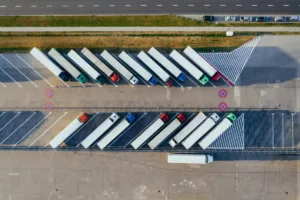What is an Acceptable Driving Record for CDL?
An acceptable driving record for CDL is a key requirement for any commercial driver. Employers rely on driving records to ensure safety, compliance, and the qualifications of their drivers. The definition of “acceptable” can vary but typically involves minimal violations, no serious offenses, and adherence to FMCSA regulations.
For CDL holders, a clean record isn’t just about landing a job—it’s also about keeping your license. This guide will help you understand what makes a driving record acceptable, what can disqualify you, and how Drivers Files Online supports CDL compliance and documentation.
Sign Up For Simplified CDL Compliance and Management!
What Does an Acceptable Driving Record for CDL Look Like?
An acceptable driving record demonstrates responsibility and adherence to safety standards. Here’s what employers typically look for:
Key Elements of an Acceptable Driving Record
- Minimal Traffic Violations: Occasional minor infractions like speeding or failure to signal may be acceptable, but repeated violations indicate unsafe driving habits.
- Clean Accident History: Avoiding at-fault accidents is a critical factor in determining a driver’s safety record.
- No DUIs or Reckless Driving: Serious offenses like DUIs or reckless driving are significant red flags for employers.
- Medical Compliance: Maintaining a valid medical card is essential. Failure to do so can lead to a CDL license downgrade.
Employers also consider how recent violations are, as older infractions carry less weight than recent ones.
RELATED: Commercial Driver Drug Testing: Guide for CDL Companies
Why Do Driving Records Matter?
Driving records are a comprehensive summary of a driver’s behavior on the road, and they play a pivotal role in ensuring safety and compliance.
Insurance Costs
A clean record often results in lower insurance premiums. Conversely, drivers with poor records increase costs for their employers, making a good record a valuable asset. Learn more about MVR reports for insurance agents if you’re interested in learning more about how liability works in the CDL industry.
Regulatory Compliance
Under FMCSA regulations, companies are responsible for verifying that drivers meet qualifications. A poor driving record can lead to fines, penalties, or even legal issues.
Safety Standards
Employers prioritize drivers with acceptable records to ensure the safety of their fleet and the public. A single reckless driver can tarnish a company’s reputation and lead to costly accidents.
People also asked: CDLIS Meaning: What is a CDLIS Report and What to Know!
What Can Disqualify a Driving Record?

Understanding what disqualifies a driving record is just as important as knowing what makes it acceptable.
1. Major Violations
DUI or Drug Offenses
Driving under the influence is one of the most serious violations and often results in immediate disqualification.
Reckless Driving
Behaviors that display a disregard for safety, such as excessive speeding, can lead to disqualification.
Hit-and-Run Incidents
Leaving the scene of an accident is a major violation and can lead to license suspension or revocation.
License Suspensions
A history of license suspensions due to non-payment of tickets or failure to appear in court can make a record unacceptable.
2. Repeated Minor Violations
A pattern of smaller infractions, such as speeding tickets, can raise concerns about a driver’s reliability and safety.
3. Medical Non-Compliance
Drivers must maintain up-to-date medical cards. Non-compliance often results in a CDL license downgrade or suspension.
More about medical cards: Iowa DOT Medical Card FAQs: Here’s Everything to Know!
How Employers Verify Driving Records
Employers use two primary tools to evaluate driver qualifications: MVR reports and PSP reports.
MVR Reports
A Motor Vehicle Record (MVR) provides a detailed overview of a driver’s history, including:
- Traffic violations
- Accidents
- License suspensions
- Endorsements and restrictions
Employers rely on MVRs to ensure candidates meet their safety and compliance standards.
PSP Reports
A Pre-Employment Screening Program (PSP) report is specific to CDL holders and includes:
- A five-year crash history
- A three-year roadside inspection history
PSP reports give employers a deeper understanding of a driver’s performance on the road.
How Drivers Files Online Supports CDL Compliance

Managing driver records can be challenging, but Drivers Files Online makes it seamless with powerful tools and automation.
1. Instant Access to MVR Reports
With Drivers Files Online, employers can quickly access MVR reports to evaluate driver histories. These reports are integrated into the platform, making reviews efficient and hassle-free.
2. PSP Report Integration
Our system provides access to PSP reports, allowing companies to review crash and inspection histories. This ensures informed hiring decisions based on reliable data.
3. Automated Medical Card Tracking
We simplify compliance by sending reminders about upcoming medical card expirations. This reduces the risk of non-compliance and disqualification due to outdated certifications.
4. Secure Document Storage
All driver qualification files, including MVRs and medical certifications, are stored securely in one place for easy access during audits.
5. Easily Hire New Drivers
We offer online, automated driver application software to ensure an easy process for uploading driver verification files. Track driver history and ensure all information is up-to-date, avoiding staffing issues in your CDL company.
6. Managed Services
Upgrade to our managed services and enjoy more free time. Our staff can assist you with updating and maintaining driver application documents, giving you extra support and peace of mind.
We offer a variety of packages depending on your needs, so give our pricing a browse!
The Role of Ongoing Monitoring in Maintaining Acceptable Driving Records
Maintaining an acceptable driving record for CDL is not a one-time effort—it requires continuous attention and monitoring. Ongoing compliance ensures that drivers remain eligible for employment and that companies stay ahead of potential risks.
How Monitoring Protects Drivers and Employers
- Proactive Issue Identification
Regular monitoring of driver records helps identify potential problems before they escalate. For instance, catching a speeding ticket early can allow employers to address the issue with the driver and avoid patterns of repeated violations. - Ensuring Medical Compliance
Many CDL downgrades occur due to medical non-compliance. Employers who actively track medical certifications ensure that drivers renew their medical cards on time, avoiding disqualifications and disruptions to operations. - Reducing Insurance Costs
Drivers with clean and monitored records are less risky to insure. Employers that demonstrate consistent record monitoring can often negotiate lower insurance premiums, leading to significant cost savings.
View our blog to see a variety of ways we help with CDL compliance!
How Drivers Files Online Simplifies Ongoing Monitoring
With Drivers Files Online, CDL companies can automate much of the monitoring process:
- Real-Time Updates: Receive notifications about changes to a driver’s record, such as newly issued violations or suspensions.
- Automatic Reminders: Get alerts for upcoming medical card renewals, license expirations, or annual reviews.
- Secure Record Storage: Keep all driver qualification files updated and easily accessible during audits or inspections.
By integrating ongoing monitoring into your compliance strategy, you protect your business and empower your drivers to maintain professional standards. With our features Drivers Files Online, staying compliant has never been easier!
Stay Ahead of CDL Driving Records with Drivers Files Online

Maintaining an acceptable driving record for CDL is crucial for drivers who want to secure and retain jobs in the trucking industry. Employers must also prioritize compliance to ensure their operations run smoothly and meet FMCSA standards.
Drivers Files Online simplifies compliance by offering tools like instant MVR access, PSP integration, and automated reminders for medical certifications. These features ensure that both drivers and companies remain compliant, safe, and efficient.
Disclaimer
This content is for informational purposes only. For specific regulations, consult the FMCSA or your state licensing agency.
Frequently Asked Questions (FAQ)
What is an Acceptable Driving Record for CDL?
An acceptable driving record includes minimal violations, no major offenses like DUIs, and compliance with FMCSA regulations.
Can Minor Violations Disqualify a CDL Holder?
Repeated minor violations, such as frequent speeding tickets, can disqualify a driver by indicating unsafe driving patterns.
What Happens If My CDL is Downgraded?
A CDL license downgrade often occurs due to medical non-compliance or other regulatory issues. Drivers must address the cause to regain their CDL.
How Can Drivers Files Online Help?
Drivers Files Online provides access to MVR and PSP reports, tracks compliance deadlines, and stores critical documents securely.
